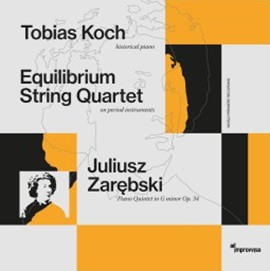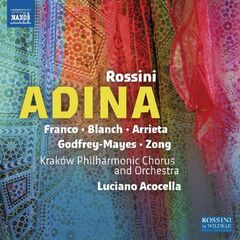Rossinis 1826 uraufgeführte Farce Adina ist eine Art Puzzle mit neuem Material sowie solchem, das der Komponist früheren Kompositionen entnahm. Angeblich gibt es darin sogar Musik, deren Herkunft nicht klar nachzuweisen ist.
Die Geschichte erinnert stark an Mozarts Die Entführung aus dem Serail und bietet eine Reihe interessanter Arien für Solisten.
Adina wird in dieser Farce mit ihrem längst vergessenen und tot geglaubten Geliebten Selimo konfrontiert. Doch gleichzeitig lässt sie sich auf eine Ehe mit dem Kalifen ein, dem sie für ihre Rettung dankbar ist. Im Finale der Oper erkennt der eifersüchtige Kalif Adina als seine Tochter an und gibt sie ihrem geliebten Selimo zur Frau.
In der Partitur fehlt ein Trio, das vorgesehen war, aber nie komponiert wurde. In dieser Aufführung wird ein Trio aus La schiava di Bagdad von Giovanni Pacini benutzt, das die Beziehung zwischen den beiden Liebenden Adina und Selimo vertiefen soll und auch die Rolle des Buffo Mustafà aufwertet.
Sara Blanch singt die Adina mit guter Charakterisierungskunst und einer Stimme die brillant leuchtet und die Koloraturen virtuos meistert.
Dem venezolanischen Tenor Cesar Arrieta wurde die Rolle des Selimo anvertraut. Seine Stimme ist weich und charmant, mit leichtem Hang zum Näseln.
Die Leistung von Emmanuel Franco, einem mexikanischen Bassbariton, in der Rolle des kalifen ist bemerkenswert. Mit seiner flexiblen, wohl projizierenden Stimme hat er alles, was diese Figur braucht.
Der chinesische Bass Shi Zong wirkt als Mustafa etwas blass in dieser Produktion.
Dank Luciano Acocellas Dirigat kommt auch der Orchesterpart besonders gut zur Geltung. Der polnische Chor singt untadelig.
Rossini’s farce Adina, which premiered in 1826, is a kind of puzzle featuring new material as well as material taken from the composer’s earlier compositions. It is said to even contain music whose origin cannot be clearly traced.
The story is strongly reminiscent of Mozart’s The Abduction from the Seraglio and offers a number of interesting arias for soloists.
In this farce, Adina is confronted with her long-forgotten lover Selimo, whom she believed to be dead. At the same time, however, she agrees to marry the Caliph, to whom she is grateful for saving her life. In the opera’s finale, the jealous Caliph recognizes Adina as his daughter and gives her to her beloved Selimo as his wife.
The score is missing a trio that was planned but never composed. In this performance, a trio from La schiava di Bagdad by Giovanni Pacini is used to deepen the relationship between the two lovers, Adina and Selimo, and also to enhance the role of Buffo Mustafà.
Sara Blanch sings Adina with great characterization and a voice that shines brilliantly and masters the coloratura with virtuosity.
The role of Selimo was entrusted to Venezuelan tenor César Arrieta. His voice is soft and charming, though it does have a slight tendency to nasalize.
Emmanuel Franco’s performance as the Caliph is also remarkable. With his flexible, well-projected voice, he embodies the character perfectly.
In this production, Chinese bass Shi Zong seems a little pale as Mustafa. Thanks to Luciano Acocella’s conducting, the orchestral part also comes into its own. The Polish choir sings impeccably.























